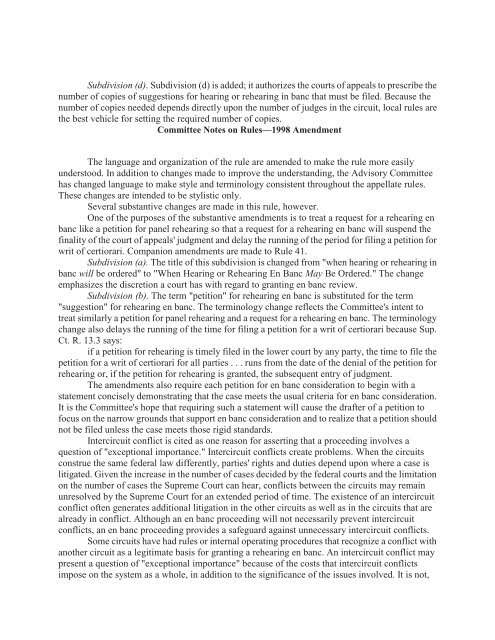Federal Rules of Appellate Procedure 2014-2015, 2014a
Federal Rules of Appellate Procedure 2014-2015, 2014a
Federal Rules of Appellate Procedure 2014-2015, 2014a
Create successful ePaper yourself
Turn your PDF publications into a flip-book with our unique Google optimized e-Paper software.
Subdivision (d). Subdivision (d) is added; it authorizes the courts <strong>of</strong> appeals to prescribe the<br />
number <strong>of</strong> copies <strong>of</strong> suggestions for hearing or rehearing in banc that must be filed. Because the<br />
number <strong>of</strong> copies needed depends directly upon the number <strong>of</strong> judges in the circuit, local rules are<br />
the best vehicle for setting the required number <strong>of</strong> copies.<br />
Committee Notes on <strong>Rules</strong>—1998 Amendment<br />
The language and organization <strong>of</strong> the rule are amended to make the rule more easily<br />
understood. In addition to changes made to improve the understanding, the Advisory Committee<br />
has changed language to make style and terminology consistent throughout the appellate rules.<br />
These changes are intended to be stylistic only.<br />
Several substantive changes are made in this rule, however.<br />
One <strong>of</strong> the purposes <strong>of</strong> the substantive amendments is to treat a request for a rehearing en<br />
banc like a petition for panel rehearing so that a request for a rehearing en banc will suspend the<br />
finality <strong>of</strong> the court <strong>of</strong> appeals' judgment and delay the running <strong>of</strong> the period for filing a petition for<br />
writ <strong>of</strong> certiorari. Companion amendments are made to Rule 41.<br />
Subdivision (a). The title <strong>of</strong> this subdivision is changed from "when hearing or rehearing in<br />
banc will be ordered" to "When Hearing or Rehearing En Banc May Be Ordered." The change<br />
emphasizes the discretion a court has with regard to granting en banc review.<br />
Subdivision (b). The term "petition" for rehearing en banc is substituted for the term<br />
"suggestion" for rehearing en banc. The terminology change reflects the Committee's intent to<br />
treat similarly a petition for panel rehearing and a request for a rehearing en banc. The terminology<br />
change also delays the running <strong>of</strong> the time for filing a petition for a writ <strong>of</strong> certiorari because Sup.<br />
Ct. R. 13.3 says:<br />
if a petition for rehearing is timely filed in the lower court by any party, the time to file the<br />
petition for a writ <strong>of</strong> certiorari for all parties . . . runs from the date <strong>of</strong> the denial <strong>of</strong> the petition for<br />
rehearing or, if the petition for rehearing is granted, the subsequent entry <strong>of</strong> judgment.<br />
The amendments also require each petition for en banc consideration to begin with a<br />
statement concisely demonstrating that the case meets the usual criteria for en banc consideration.<br />
It is the Committee's hope that requiring such a statement will cause the drafter <strong>of</strong> a petition to<br />
focus on the narrow grounds that support en banc consideration and to realize that a petition should<br />
not be filed unless the case meets those rigid standards.<br />
Intercircuit conflict is cited as one reason for asserting that a proceeding involves a<br />
question <strong>of</strong> "exceptional importance." Intercircuit conflicts create problems. When the circuits<br />
construe the same federal law differently, parties' rights and duties depend upon where a case is<br />
litigated. Given the increase in the number <strong>of</strong> cases decided by the federal courts and the limitation<br />
on the number <strong>of</strong> cases the Supreme Court can hear, conflicts between the circuits may remain<br />
unresolved by the Supreme Court for an extended period <strong>of</strong> time. The existence <strong>of</strong> an intercircuit<br />
conflict <strong>of</strong>ten generates additional litigation in the other circuits as well as in the circuits that are<br />
already in conflict. Although an en banc proceeding will not necessarily prevent intercircuit<br />
conflicts, an en banc proceeding provides a safeguard against unnecessary intercircuit conflicts.<br />
Some circuits have had rules or internal operating procedures that recognize a conflict with<br />
another circuit as a legitimate basis for granting a rehearing en banc. An intercircuit conflict may<br />
present a question <strong>of</strong> "exceptional importance" because <strong>of</strong> the costs that intercircuit conflicts<br />
impose on the system as a whole, in addition to the significance <strong>of</strong> the issues involved. It is not,


















